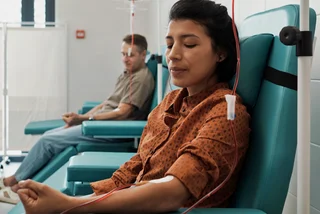The Czech Ministry of Health has issued a new decree, effective July 1, that allows gay and bisexual men to donate blood. Previously, men who had sex with men were excluded from donating blood if they had been sexually active within the last six months or 12 months prior to 2019.
The ministry stated that the updated policy, developed in cooperation with the Society for Transfusion Medicine, is based on internationally accepted recommendations. The new decree excludes all individuals who have engaged in high-risk sexual practices, regardless of gender or sexual orientation, from donating blood.
“Excluded are those who have had anal intercourse with a new sexual partner or multiple partners in the last four months or provided sex for money or drugs,” the ministry said on its website.
The ministry defended the previous exclusion policy on the grounds that sex between men poses a higher risk of HIV infection. However, minority rights initiatives have long considered the policy discriminatory.
Giving blood in Czechia
- Blood from donors is used for blood transfusions, special preparations, and medicines. Blood plasma is beneficial for patients with immunity or blood clotting disorders.
- Additionally, blood transfusions are administered to individuals during surgery or in cases of bleeding in the digestive tract, childbirth, or to treat neonatal jaundice.
- The blood draw takes about ten minutes, during which approximately 450 ml of blood is taken. Donating blood is free, and donors are entitled to time off work on the donation day. Health insurance companies may offer other bonuses for blood donation.
“The safety of the recipients of donated blood thus continues to be assured,” the ministry added, noting that donors will still need to complete a questionnaire about their medical history and recent activities that could impact their eligibility.
Among the conditions that may exclude someone from donating blood are illnesses such as hepatitis or tuberculosis, chronic diseases such as high blood pressure or a recent heart attack, or recent problems such as antibiotic use.
The ministry also mentioned that reasons for exclusion may include recent travel to certain high-risk countries, getting tattoos, or having an attached tick. The ministry emphasized that these measures are in place to ensure the safety of blood recipients.
According to the Czech Red Cross, approximately 220,000 people donate blood in the Czech Republic, with about 30,000 new donations yearly. Experts estimate that at least 300,000 regular donors would be needed to supply hospitals with blood adequately, and about 5,000 more new donors per year would be necessary to cover the decline in donors due to age or disease.












 Reading time: 2 minutes
Reading time: 2 minutes 
























